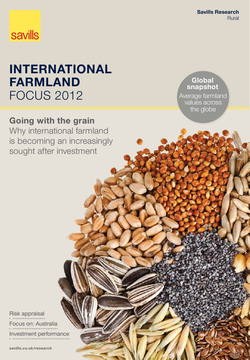Savills UK
International Farmland Focus 2012
Going with the grain
Why international farmland is becoming an increasingly sought after investment
Summary of results
Brazil and Australia top the table for investment opportunities. The opportunity for large scale farming is a key driver in both countries, but location is critical, with the best opportunities requiring adequate rainfall/water, good soils and infrastructure. Australia also scores well politically, economically and the liquidity of the farmland market is good.
Although Argentina and Brazil show similar benefit scores, the Rural Land Law passed in Argentina in late 2011 has severely limited foreign ownership in the country. In Brazil, there have been similar calls to limit foreign ownership and in August 2010 sales to foreign investors were suspended while the law was reviewed. However, the government in Brazil is expected to approve a less restrictive proposal for farmland ownership by foreigners.
The Central European countries surveyed, with the exception of Hungary, have a good balance score driven by strong potential returns from good agronomic performance and the opportunity for large scale farming. The score balance is slightly dampened by political/economic uncertainty and the current restrictions on foreign ownership, many of which will expire once the accession deregulation periods come to an end.
The UK sits roughly in the middle of the table and still represents a good place for farmland investment, although it falls down in terms of farm scale and a low turnover in the farmland market.
Although political and economic uncertainty is low across Western Europe, the markets in Denmark and France are still restrictive to foreign ownership, and in Ireland, large scale farming opportunities are rare, hence these countries feature at the bottom end of the scale.
There is a reasonable amount of acquisitive activity in Africa but a lack of complete data has precluded us from including African countries in our matrix. The available evidence does suggest this is a continent with high growth potential in the agricultural sector, where long-term under-investment offers exciting opportunities. However, the risks and challenges are high, with potential investors seen as ‘land grabbers’. At a practical level the risks include land tenure and poor infrastructure.
Download the PDF (770kb)
Summary of results
Brazil and Australia top the table for investment opportunities. The opportunity for large scale farming is a key driver in both countries, but location is critical, with the best opportunities requiring adequate rainfall/water, good soils and infrastructure. Australia also scores well politically, economically and the liquidity of the farmland market is good.
Although Argentina and Brazil show similar benefit scores, the Rural Land Law passed in Argentina in late 2011 has severely limited foreign ownership in the country. In Brazil, there have been similar calls to limit foreign ownership and in August 2010 sales to foreign investors were suspended while the law was reviewed. However, the government in Brazil is expected to approve a less restrictive proposal for farmland ownership by foreigners.
The Central European countries surveyed, with the exception of Hungary, have a good balance score driven by strong potential returns from good agronomic performance and the opportunity for large scale farming. The score balance is slightly dampened by political/economic uncertainty and the current restrictions on foreign ownership, many of which will expire once the accession deregulation periods come to an end.
The UK sits roughly in the middle of the table and still represents a good place for farmland investment, although it falls down in terms of farm scale and a low turnover in the farmland market.
Although political and economic uncertainty is low across Western Europe, the markets in Denmark and France are still restrictive to foreign ownership, and in Ireland, large scale farming opportunities are rare, hence these countries feature at the bottom end of the scale.
There is a reasonable amount of acquisitive activity in Africa but a lack of complete data has precluded us from including African countries in our matrix. The available evidence does suggest this is a continent with high growth potential in the agricultural sector, where long-term under-investment offers exciting opportunities. However, the risks and challenges are high, with potential investors seen as ‘land grabbers’. At a practical level the risks include land tenure and poor infrastructure.
Download the PDF (770kb)














